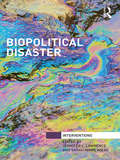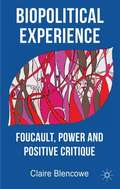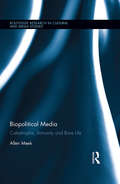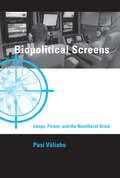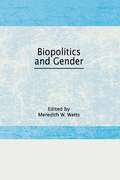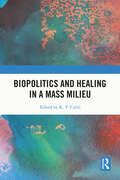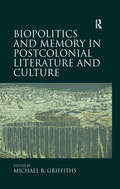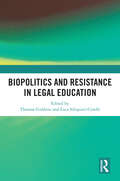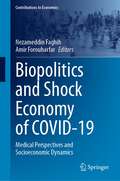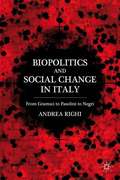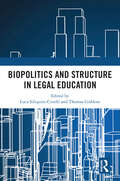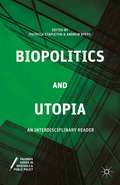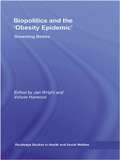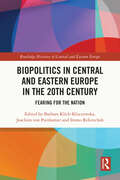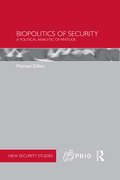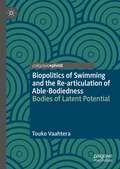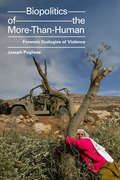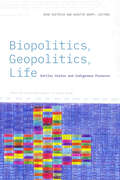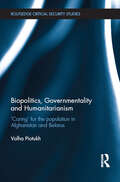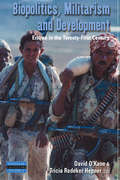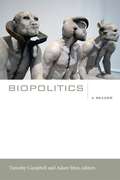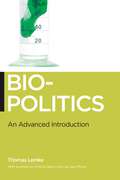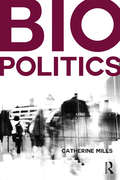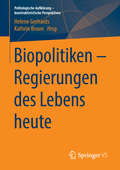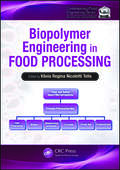- Table View
- List View
Biopolitical Disaster (Interventions)
by Jennifer L. Lawrence Sarah Marie WiebeBiopolitical Disaster employs a grounded analysis of the production and lived-experience of biopolitical life in order to illustrate how disaster production and response are intimately interconnected. The book is organized into four parts, each revealing how socio-environmental consequences of instrumentalist environmentalities produce disastrous settings and political experiences that are evident in our contemporary world. Beginning with "Commodifying crisis," the volume focuses on the inherent production of disaster that is bound to the crisis tendency of capitalism. The second part, "Governmentalities of disaster," addresses material and discursive questions of governance, the role of the state, as well as questions of democracy. This part explores the linkage between problematic environmental rationalities and policies. Third, the volume considers how and where the (de)valuation of life itself takes shape within the theme of "Affected bodies," and investigates the corporeal impacts of disastrous biopolitics. The final part, "Environmental aesthetics and resistance," fuses concepts from affect theory, feminist studies, post-positivism, and contemporary political theory to identify sites and practices of political resistance to biopower. Biopolitical Disaster will be of great interest to postgraduates, researchers, and academic scholars working in Political ecology; Geopolitics; Feminist critique; Intersectionality; Environmental politics; Science and technology studies; Disaster studies; Political theory; Indigenous studies; Aesthetics; and Resistance.
Biopolitical Experience
by Claire BlencoweAn original, comprehensive interpretation of Michel Foucault's analysis of biopolitics situating biopolitics in the context of embodied histories of subjectivity, affective investments and structures of experience. Going beyond lamentation at the horrors of biopolitical domination, the book develops a positive-critique of biopolitical experience. "
Biopolitical Media: Catastrophe, Immunity and Bare Life (Routledge Research in Cultural and Media Studies)
by Allen MeekThis book presents an historical account of media and catastrophe that engages with theories of biopolitics in the work of Michel Foucault, Giorgio Agamben, Michael Hardt, Antonio Negri and others. It explains how responses to catastrophe in media and cultural criticism over the past 150 years are embedded in biological conceptions of life and death, contamination and immunity, race and species. Mediated catastrophe is often understood today in terms of collective memory and according to therapeutic or redemptive accounts of trauma. In contrast to these approaches this book emphasizes the use of media to record, archive and analyze physical appearance and movement; to capture viewer attention through shock; to monitor and control bodies in economies of production and consumption; to enmesh social relations in information networks; and situate subjects in discourses of victimhood, immunity, survival and resilience. Chapters are focused on historical case studies of early photography, Nazi propaganda, colonial stereotypes, Hiroshima, the Holocaust, the Cold War and the war on terror.
Biopolitical Screens: Image, Power, and the Neoliberal Brain (Leonardo)
by Pasi ValiahoAn investigation of the aesthetics and politics of new visual media under twenty-first-century capitalism, from console games to virtual reality to video installation art. In Biopolitical Screens, Pasi Väliaho charts and conceptualizes the imagery that composes our affective and conceptual reality under twenty-first-century capitalism. Väliaho investigates the role screen media play in the networks that today harness human minds and bodies—the ways that images animated on console game platforms, virtual reality technologies, and computer screens capture human potential by plugging it into arrangements of finance, war, and the consumption of entertainment. Drawing on current neuroscience and political and economic thought, Väliaho argues that these images work to shape the atomistic individuals who populate the neoliberal world of accumulation and war.Väliaho bases his argument on a broad notion of the image as something both visible and sayable, detectable in various screen platforms but also in scientific perception and theoretical ideas. After laying out the conceptual foundations of the book, Väliaho offers focused and detailed investigations of the current visual economy. He considers the imagery of first-person shooter video games as tools of “neuropower”; explores the design and construction of virtual reality technologies to treat post-traumatic stress disorder in veterans of Iraq and Afghanistan; and examines three instances of video installation art that have the power to disrupt the dominant regime of sensibility rather than reinforce it.
Biopolitics and Gender
by Meredith W Watts JrHere is an important book for social scientists interested in the influence of gender on certain types of behavior. Several perspectives are presented on the general topic of biopolitics and gender, including the points of view of brain science, endocrinology, ethology, psychophysiology, and such conventional interests as political attitudes, socialization, participation, social structure, and political hierarchy. The varied and provocative ideas explored in this volume will broaden discussions of gender beyond an exclusive focus on sex links to oppression and discrimination.
Biopolitics and Healing in a Mass Milieu
by K. V. CybilSeveral of the key concepts of biopolitics have come under scrutiny since the outbreak of Covid-19 pandemic. This volume brings into discussion how biopolitics can be conceptualized critically within a milieu of mass healing, such as in India. Pouring through the decolonial lens of healing, contributors to this volume discuss crucial themes like geropolitics and pandemic reflections on the question of old age; borders and logistics in a world emerging from the pandemic; immunization of humans and humanization of immunity, thus defining the Indian contexts of the biopolitical problematic. Extending its analysis into a retrospective vision of thought traditions and socio-political underpinnings that shaped modernity and post-coloniality in India, it also explores the medico-therapeutical discourse embedded in philosophy of medicine and philosophical modernity tracing its interstitial positioning as therapeutic-assemblages in a milieu of mass healing. This book will be useful for scholars and researchers of biopolitics, philosophy, political philosophy, sociology, science and technology studies, medical sociology, health and well-being, and cultural studies.
Biopolitics and Memory in Postcolonial Literature and Culture
by Michael R. GriffithsFrom the Truth and Reconciliation Commission in South Africa to the United Nations Permanent Memorial to the Victims of Slavery and the Transatlantic Slave Trade, many worthwhile processes of public memory have been enacted on the national and international levels. But how do these extant practices of memory function to precipitate justice and recompense? Are there moments when such techniques, performances, and displays of memory serve to obscure and elide aspects of the history of colonial governmentality? This collection addresses these and other questions in essays that take up the varied legacies, continuities, modes of memorialization, and poetics of remaking that attend colonial governmentality in spaces as varied as the Maghreb and the Solomon Islands. Highlighting the continued injustices arising from a process whose aftermath is far from settled, the contributors examine works by twentieth-century authors representing Asia, Africa, North America, Latin America, Australia, and Europe. Imperial practices throughout the world have fomented a veritable culture of memory. The essays in this volume show how the legacy of colonialism’s attempt to transform the mode of life of colonized peoples has been central to the largely unequal phenomenon of globalization.
Biopolitics and Resistance in Legal Education
by Thomas Giddens and Luca Siliquini-CinelliTaking up the study of legal education in distinctly biopolitical terms, this book provides a critical and political analysis of resistance in the law school. Legal education concerns the complex pathways by which an individual becomes a lawyer, making the journey from lay-person to expert, from student to practitioner. To pose the idea of a biopolitics of legal education is not only to recognise the tensions surrounding this journey but also to recognise that legal education is a key site in which the subject engages, and is engaged by, a particular structure—and here the particular structure of the law school. This book explores the resistance to that structure, including: different ways in which law’s pedagogic structures might be incomplete, or are being fought against; the use of less conventional elements of cultural discourse to resist the abstraction of the lawyer in students’ subject formation; the centralisation of queer and feminist discourses to disrupt the hierarchies of the legal curriculum; the use of digital technologies; the place of embodiment in legal education settings; and the impacts of posthuman knowledges and contexts on legal learning. Assembling original, field-defining essays by both leading international scholars and emerging researchers, this book constitutes an indispensable resource in legal education research and scholarship that will appeal to legal academics everywhere.
Biopolitics and Shock Economy of COVID-19: Medical Perspectives and Socioeconomic Dynamics (Contributions to Economics)
by Nezameddin Faghih Amir ForouharfarThis edited volume discusses the biopolitics and shock economy of COVID-19, emphasizing medical perspectives and the socioeconomic dynamics of the pandemic and the ensuing institutional responses. Written by an international, multidisciplinary group of academic and professional experts, chapters embrace a wide range of topics such as: medical perspectives on COVID-19; application of geospatial technology; infectivity, immunogenicity, and disease as important factors for adoption of relevant biopolitical measures; shock economy; COVID-19-induced transaction costs; social support and resilience of inhabitants of marginalized areas; business resilience factors; entrepreneurship; and digital transformation. Jointly addressing global examples of biopolitical governance and overarching macroeconomic effects of the pandemic, this volume will be of interest to academics across disciplines as well as policymakers and practitioners on the ground.
Biopolitics and Social Change in Italy
by Andrea RighiThe study of how life can be controlled, supported, and manipulated has become the most urgent scientific and political task of our society. By placing the social dimension of labor at the base of the discourse of life, this book engages with the work of key intellectual figures including Gramsci, Pasolini, the neo-feminist militants of Lotta Femminista, Negri, and Virno, and reconstructs a critical genealogy of the notion of biopolitics from the point of view of twentieth and twenty-first century Italy. "
Biopolitics and Structure in Legal Education
by Luca Siliquini-Cinelli and Thomas GiddensTaking up the study of legal education in distinctly biopolitical terms, this book provides a critical and political analysis of structure in the law school. Legal education concerns the complex pathways by which an individual becomes a lawyer, making the journey from lay-person to expert, from student to practitioner. To pose the idea of a biopolitics of legal education is not only to recognise the tensions surrounding this journey, but also to recognise that legal education is a key site in which the subject engages, and is engaged by, a particular structure—and here the particular structure of the law school. This book explores that structure by addressing the characteristics of the biopolitical orders engaged in legal education, including: understanding the lawyer as a commodity, unpicking the force relations in legal education, examining the ways codes of conduct in higher education impact academic freedom, as well as putting the distinctly Western structures of legal learning within a wider context. Assembling original, field-defining essays by both leading international scholars and emerging researchers, it constitutes an indispensable resource in legal education research and scholarship that will appeal to legal academics everywhere.
Biopolitics and Utopia: An Interdisciplinary Reader (Palgrave Series in Bioethics and Public Policy)
by Patricia Stapleton Andrew ByersThis interdisciplinary reader offers a fascinating exploration of the intersection of biopolitics and utopia by employing a range of theoretical approaches. Each essay provides a unique application of the two concepts to topics spanning the social sciences and humanities.
Biopolitics and the 'Obesity Epidemic': Governing Bodies (Routledge Studies in Health and Social Welfare)
by Jan Wright Valerie HarwoodBiopolitics and the ‘Obesity Epidemic’ is the first edited collection of critical perspectives on the 'obesity epidemic.' The volume provides a comprehensive discussion of current issues in the critical analysis of health, obesity and society, and the impact of obesity discourses on different individuals, social groups and institutions. Contributors from the UK, Canada, New Zealand and Australia provide original, accessible, and engaging chapters on issues such as the effects on individuals, families, youths and schools. The timely contributions offered by Biopolitics and the ‘Obesity Epidemic’ to this highly topical area will be of interest to a wide range of readers, including teachers, education professionals, community health and allied professionals, and academics in areas such as education, health, youth studies, social work and psychology.
Biopolitics in Central and Eastern Europe in the 20th Century: Fearing for the Nation (Routledge Histories of Central and Eastern Europe)
by Joachim Von Puttkamer Barbara Klich-Kluczewska Immo RebitschekThe field of biopolitics encompasses issues from health and hygiene, birth rates, fertility and sexuality, life expectancy and demography to eugenics and racial regimes. This book is the first to provide a comprehensive view on these issues for Central and Eastern Europe in the twentieth century. The cataclysms of imperial collapse, World War(s) and the Holocaust but also the rise of state socialism after 1945 provided extraordinary and distinct conditions for the governing of life and death. The volume collects the latest research and empirical studies from the region to showcase the diversity of biopolitical regimes in their regional and global context – from hunger relief for Hungarian children after the First World War to abortion legislation in communist Poland. It underlines the similarities as well, demonstrating how biopolitical strategies in this area often revolved around the notion of an endangered nation; and how ideological schemes and post-imperial experiences in Eastern Europe further complicate a 'western' understanding of democratic participatory and authoritarian repressive biopolitics. The new geographical focus invites scholars and students of social and human sciences to reconsider established perspectives on the history of population management and the history of Europe.
Biopolitics of Security: A Political Analytic of Finitude (PRIO New Security Studies)
by Michael DillonTaking its inspiration from Michel Foucault, this volume of essays integrates the analysis of security into the study of modern political and cultural theory. Explaining how both politics and security are differently problematised by changing accounts of time, the work shows how, during the course of the 17th century, the problematisation of government and rule became newly enframed by a novel account of time and human finitude, which it calls ‘factical finitude’. The correlate of factical finitude is the infinite, and the book explains how the problematisation of politics and security became that of securing the infinite government of finite things. It then explains how concrete political form was given to factical finitude by a combination of geopolitics and biopolitics. Modern sovereignty required the services of biopolitics from the very beginning. The essays explain how these politics of security arose at the same time, changed together, and have remained closely allied ever since. In particular, the book explains how biopolitics of security changed in response to the molecularisation and digitalisation of Life, and demonstrates how this has given rise to the dangers and contradictions of 21st century security politics. This book will be of much interest to students of political and cultural theory, critical security studies and International Relations.
Biopolitics of Swimming and the Re-articulation of Able-Bodiedness: Bodies of Latent Potential
by Touko VaahteraIn this book, Touko Vaahtera explores how “bodies of latent potential,” a cultural attachment to the idea of body as potentiality, carries with it hierarchizing hopes about better bodies. Vaahtera combines disability studies, cultural studies, feminist science studies, transgender studies, post-colonial studies, and Foucauldian genealogy to offer a provocative approach that interrogates capacities and capabilities as obvious frameworks for thinking about the body. Vaahtera explores how swimming skills emerged as a specific biopolitical question in Finland, a country that has been described as the “Land of a Thousand Lakes.” Through a profound cultural analysis focusing both on Finnish cultural texts on swimming as well as manifold more globalized texts, Vaahtera considers how the legacy of eugenics and colonialism, the hopes of civilization, and homogenizing assumptions about bodies frame how we think about human capacity.
Biopolitics of the More-Than-Human: Forensic Ecologies of Violence (ANIMA: Critical Race Studies Otherwise)
by Joseph PuglieseIn Biopolitics of the More-Than-Human Joseph Pugliese examines the concept of the biopolitical through a nonanthropocentric lens, arguing that more-than-human entities—from soil and orchards to animals and water—are actors and agents in their own right with legitimate claims to justice. Examining occupied Palestine, Guantánamo, and sites of US drone strikes in Afghanistan, Pakistan, Somalia, and Yemen, Pugliese challenges notions of human exceptionalism by arguing that more-than-human victims of war and colonialism are entangled with and subject to the same violent biopolitical regimes as humans. He also draws on Indigenous epistemologies that invest more-than-human entities with judicial standing to argue for an ethico-legal framework that will enable the realization of ecological justice. Bringing the more-than-human world into the purview of justice, Pugliese makes visible the ecological effects of human war that would otherwise remain outside the domains of biopolitics and law.
Biopolitics, Geopolitics, Life: Settler States and Indigenous Presence
by René Dietrich and Kerstin KnopfThe contributors to Biopolitics, Geopolitics, Life investigate biopolitics and geopolitics as two distinct yet entangled techniques of settler-colonial states across the globe, from the Americas and Hawai‘i to Australia and Aotearoa/New Zealand. Drawing on literary and cultural studies, social sciences, political theory, visual culture, and film studies, they show how biopolitics and geopolitics produce norms of social life and land use that delegitimize and target Indigenous bodies, lives, lands, and political formations. Among other topics, the contributors explore the representations of sexual violence against Native women in literature, Indigenous critiques of the carceral state in North America, Indigenous elders’ refusal of dominant formulations of aging, the governance of Indigenous peoples in Guyana, the displacement of Guaraní in Brazil, and the 2016 rule to formally acknowledge a government-to-government relationship between the US federal government and the Native Hawaiian community. Throughout, the contributors contend that Indigenous life and practices cannot be contained and defined by the racialization and dispossession of settler colonialism, thereby pointing to the transformative potential of an Indigenous-centered decolonization. Contributors René Dietrich, Jacqueline Fear-Segal, Mishuana Goeman, Alyosha Goldstein, Sandy Grande, Michael R. Griffiths, Shona N. Jackson, Kerstin Knopf, Sabine N. Meyer, Robert Nichols, Mark Rifkin, David Uahikeaikaleiʻohu Maile
Biopolitics, Governmentality and Humanitarianism: 'Caring' for the Population in Afghanistan and Belarus (Routledge Critical Security Studies)
by Volha PiotukhThis book critically analyses the changing role and nature of post-Cold War humanitarianism, using Foucault's theories of biopolitics and governmentality. It offers a compelling and insightful interpretation of the policies and practices associated with ‘new humanitarianism in general, as well as of the dynamics of two specific international assistance efforts: the post-2001 conflict-related assistance effort in Afghanistan and the post-2000 Chernobyl-related assistance effort in Belarus. The central argument of the book is that ‘new’ humanitarianism represents a dominant regime of humanitarian governing informed by globalising neoliberalism and is reliant on a complex set of biopolitical, disciplinary and sovereign technologies. It demonstrates that, while the purposes of humanitarian governing are specific to particular contexts, its promise of care is more often than not accompanied by sovereign and/or biopolitical violences. Making an important contribution to existing scholarship on humanitarian emergencies and humanitarian action, on biopolitics and governmentality, this book will be of much interest to students and scholars of humanitarianism, critical security studies, governmentality and International Relations generally.
Biopolitics, Militarism, and Development: Eritrea in the Twenty-First Century (Dislocations #6)
by Tricia Redeker Hepner David O'KaneBringing together original, contemporary ethnographic research on the Northeast African state of Eritrea, this book shows how biopolitics - the state-led deployment of disciplinary technologies on individuals and population groups - is assuming particular forms in the twenty-first century. Once hailed as the “African country that works,” Eritrea’s apparently successful post-independence development has since lapsed into economic crisis and severe human rights violations. This is due not only to the border war with Ethiopia that began in 1998, but is also the result of discernible tendencies in the “high modernist” style of social mobilization for development first adopted by the Eritrean government during the liberation struggle (1961–1991) and later carried into the post-independence era. The contributions to this volume reveal and interpret the links between development and developmentalist ideologies, intensifying militarism, and the controlling and disciplining of human lives and bodies by state institutions, policies, and discourses. Also assessed are the multiple consequences of these policies for the Eritrean people and the ways in which such policies are resisted or subverted. This insightful, comparative volume places the Eritrean case in a broader global and transnational context.
Biopolitics: A Reader
by Adam Sitze Timothy CampbellThis anthology collects the texts that defined the concept of biopolitics that has become so significant throughout the humanities and social sciences today. The far-reaching influence of the biopolitical - the relation of politics to life, or the state to the body - is not surprising given its centrality to matters such as healthcare, abortion, immigration, and the global distribution of essential medicines and medical technologies.
Biopolitics: An Advanced Introduction (Biopolitics #5)
by Thomas LemkeThe first systematic overview of the notion of biopolitics and its relevance in contemporary theoretical debateThe biological features of human beings are now measured, observed, and understood in ways never before thought possible, defining norms, establishing standards, and determining average values of human life. While the notion of “biopolitics” has been linked to everything from rational decision-making and the democratic organization of social life to eugenics and racism, Thomas Lemke offers the very first systematic overview of the history of the notion of biopolitics, exploring its relevance in contemporary theoretical debates and providing a much needed primer on the topic. Lemke explains that life has become an independent, objective and measurable factor as well as a collective reality that can be separated from concrete living beings and the singularity of individual experience. He shows how our understanding of the processes of life, the organizing of populations and the need to “govern” individuals and collectives lead to practices of correction, exclusion, normalization, and disciplining. In this lucidly written book, Lemke outlines the stakes and the debates surrounding biopolitics, providing a systematic overview of the history of the notion and making clear its relevance for sociological and contemporary theoretical debates.
Biopolitics: Bioethics And Biopolitics (International Library Of Ethics, Law, And The New Medicine Ser. #49)
by Catherine MillsThe concept of biopolitics has been one of the most important and widely used in recent years in disciplines across the humanities and social sciences. In Biopolitics, Mills provides a wide-ranging and insightful introduction to the field of biopolitical studies. The first part of the book provides a much-needed philosophical introduction to key theoretical approaches to the concept in contemporary usage. This includes discussions of the work of Michel Foucault, Giorgio Agamben, Hannah Arendt, Roberto Esposito, and Antonio Negri. In the second part of the book, Mills discusses various topics across the categories of politics, life and subjectivity. These include questions of sovereignty and governmentality, violence, rights, technology, reproduction, race, and sexual difference. This book will be an indispensable guide for those wishing to gain an understanding of the central theories and issues in biopolitical studies. For those already working with the concept of biopolitics, it provides challenging and provocative insights and argues for a ground-breaking reorientation of the field.
Biopolitiken – Regierungen des Lebens heute: Regierungen Des Lebens Heute (Politologische Aufklärung – konstruktivistische Perspektiven)
by Helene Gerhards Kathrin BraunDas Buch versammelt konstruktivistische Perspektiven auf das Konzept „Biopolitik“. Dadurch werden die Analysepotentiale für aktuelle Phänomene, die den Zusammenhang zwischen dem Leben und dem Lebendigen und der Regierbarmachung betreffen, ausgelotet. Im Fokus stehen die Strategien und die Objekte der Regierungs- und Regulierungsbemühungen: In welcher Weise werden gesellschaftliche Probleme konstruiert und bestimmten „Zielscheiben“ zugeschrieben? Welche Subjektivierungsformen lassen sich im Rahmen biopolitischer Zugriffe ausmachen? Inwiefern spielen spezifische sozialtheoretische Überlegungen und Konzeptionen von Zeit für biopolitische Strategien und Konflikte eine Rolle? An welchen Gegenständen sind die fortdauernden Konflikte, die sich im Spannungsfeld zwischen Medizin, Ethik und Politik ergeben, zu explizieren?
Biopolymer Engineering in Food Processing (Contemporary Food Engineering)
by Vnia Regina Nicoletti TelisDue to their unique properties and ability to interact with other food components, biopolymers have traditionally played a major role in food processing. Biopolymer Engineering in Food Processing explores processing technology associated with biopolymer applications and discusses both operational and economic aspects.Following an overview of biopol
